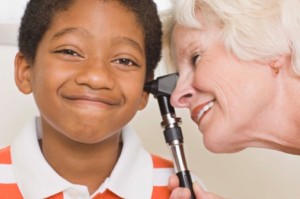October is Protect Your Hearing Month
 Did you know that October is National Protect Your Hearing Month? According to the American Academy of Audiology, hearing loss is the third most common health problem in America, and, perhaps more surprisingly, over half of the Americans experiencing this hearing loss are under the age of 65. Clearly, this is a problem that needs to be addressed. The best way to address it is by starting early to protect our children’s hearing, and teaching them to do protect their own hearing as well. If you’re wondering how best to do that, here are a few tips on things you can do:
Did you know that October is National Protect Your Hearing Month? According to the American Academy of Audiology, hearing loss is the third most common health problem in America, and, perhaps more surprisingly, over half of the Americans experiencing this hearing loss are under the age of 65. Clearly, this is a problem that needs to be addressed. The best way to address it is by starting early to protect our children’s hearing, and teaching them to do protect their own hearing as well. If you’re wondering how best to do that, here are a few tips on things you can do:
- Stay away from loud noise. If you can avoid it, try never to expose your baby or very small child to excessively loud noise. Keep stereos, radios, and TVs at a reasonable level. If you go to concerts, car races, or other very load events, bring – and use – earplugs.
- Speaking of loud noises… Does your child have an iPod or MP3 player? If so, these can be dangerous to his hearing if played at top volume. Teach your child that if he cannot hear someone talking to him above the music in their ear buds, it is too loud. The iPod has a feature that allows a parent to lock in a maximum volume that can only be changed by putting in a four digit code, so if your child has an iPod, take advantage of this feature.
- Keep a close eye on ear infections. Ear infections that go untreated can detrimentally affect hearing, so be sure to see your pediatrician if you suspect your baby or small child has an ear infection. If you have a baby, know that she may cry and pull her ears when she has an ear infection, so look for those signs. Older children are likely to complain of having sore ears.
- Keep foreign objects out of ears. This sounds like a no-brainer, but it’s worth repeating anyway. Don’t let children put things in their ears, and don’t use fingers, cotton balls or cotton swabs to remove wax from their ears.
- Catch problems early. It’s important to recognize the symptoms of hearing problems so that if your child does have hearing loss, it can be diagnosed and addressed as early as possible. If your child seems to be slow in learning to speak or consistently has trouble with new words, you may want to look into it. Definitely be sure to have your child’s pediatrician check his hearing on a regular basis.
Hearing problems can cause poor performance in school or social, emotional, or behavioral problems, so it’s very important to protect against them. You should also be aware of your own hearing – you can protect your ears the same way you protect your child’s. After all, your ability to hear clearly is important too.









all good points! i am very aware of my daughter’s noise levels on Ipod, stereo etc. and recently took her to a dirt track car race and made sure she wore earplugs
I know I need to get my hearing checked. Something’s wrong!
I like my mp3 to much!